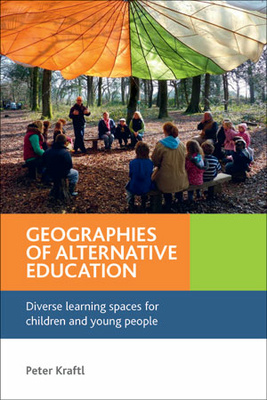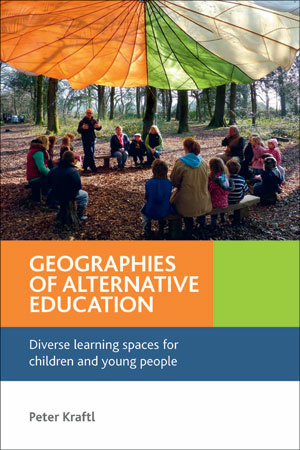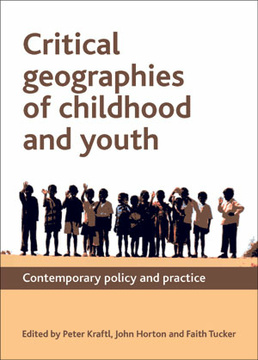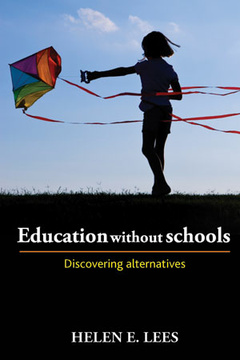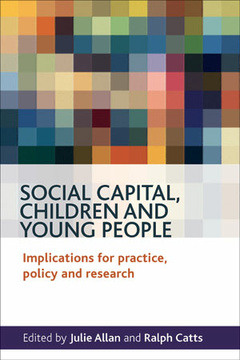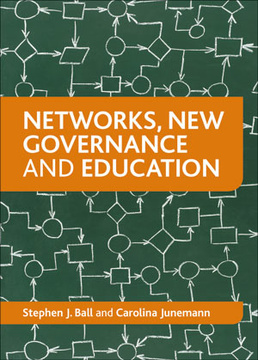Geographies of Alternative Education
Diverse Learning Spaces for Children and Young People
By Peter Kraftl
Published
Nov 12, 2014Page count
304 pagesISBN
978-1447300502Dimensions
234 x 156 mmImprint
Policy PressPublished
May 8, 2013Page count
304 pagesISBN
978-1447300496Dimensions
234 x 156 mmImprint
Policy PressPublished
Nov 12, 2014Page count
304 pagesISBN
978-1447320517Imprint
Policy PressPublished
Nov 12, 2014Page count
304 pagesISBN
978-1447320524Imprint
Policy PressThis book offers a comparative analysis of alternative education in the UK, focusing on learning spaces that cater for children and young people. It constitutes one of the first book-length explorations of alternative learning spaces outside mainstream education - including Steiner, human scale and forest schools, care farms and homeschooling.Based on original research with teachers, parents and young people at over 50 learning spaces, Geographies of alternative education demonstrates the importance of a geographical lens for understanding alternative education. In so doing, it develops contemporary theories of autonomy, emotion/affect, habit, intergenerational relations and life-itself. The book will appeal to academics and postgraduates in the fields of geography, sociology, education and youth studies. Given ongoing concerns about the state's role in providing children's education, and an increase in the number of alternative education providers in the UK and elsewhere, the book also highlights several critical questions for policy makers and practitioners.
“Scholars, educators, and policy-makers will find this to be a valuable resource given that it is a hopeful theoretical and political project around education and learning.” Yi'En Cheng , Children's Geographies (2013)
"Organised thematically, the book conveys a feeling of careful distillation....a complex path that carefully lays out a rhizomatic integration of the social and spatial...the book has a broad range, useful as a way of scoping the field" Mel McCree, University of Plymouth, Ecological artist, Educator and Writer
"...The book’s appeal is its recognition of diverse economic and autonomous practices, non-representational geographies, and the politics of life-itself, which, combined, dismantle any sense of a simple binary between ‘alternative’ and ‘mainstream’ education." Youth & Policy
"This exceptional text redefines the agenda in geographies of education by making a fascinating case for the analysis of alternative educational settings and lucidly demonstrating how this contributes to wider conceptual debates in geography and elsewhere." Sarah Holloway, Professor of Human Geography, Loughborough University
“Scholars, educators, and policy-makers will find this to be a valuable resource given that it is a hopeful theoretical and political project around education and learning.” Yi'En Cheng, Children's Geographies (2013)
"Kraftl uses his meticulously undertaken research to offer the reader far more than a straightforward study of the characteristics of alternative education. As such, I recommend the book highly." Geographical Research
"Geographies of Alternative Education is an indispensable resource for anyone who cares about the future of education. By carefully and imaginatively exploring the complex intersections between ‘alternative’ and ‘mainstream’ education, Peter Kraftl brings to light a diverse range of ways of doing and thinking about education." Dr Ben Anderson, Durham University
Peter Kraftl is Professor of Human Geography at the University of Leicester, UK. He is the author of four books and over 50 journal articles and book chapters about children's geographies, education, and geographies of architecture. He is an editor of Children's Geographies journal.
Introduction;
Conceptual frameworks: towards geographies of alternative education;
Alternative learning spaces in the UK: background to the case studies used in this book;
Connection/disconnection: positioning alternative learning spaces;
Mess/order: materials, timings, feelings;
Movement/embodiment: learning habits (I);
Inter/personal relations: scale, love and learning habits (II);
Towards the ‘good life’: alternative visions of learning, love and life-itelf;
Conclusion: Geographies of alternative education and the value of autonomous learning.







